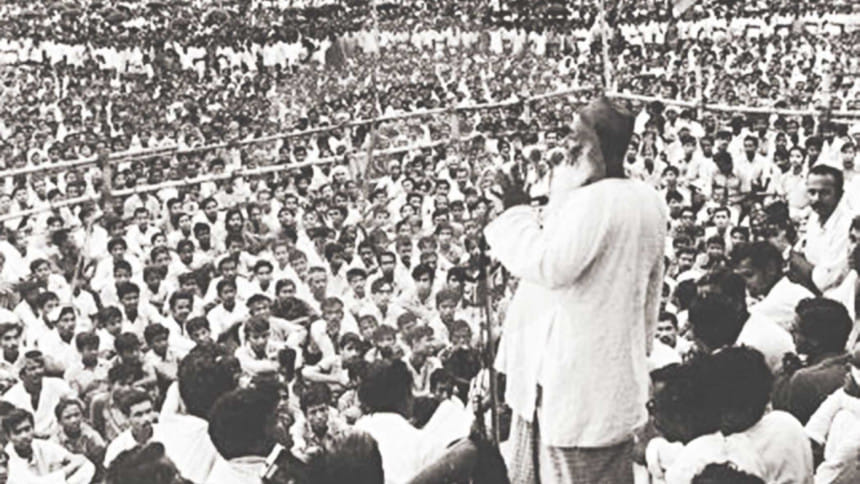Our foremost peasant leader and revolutionary

He was described as an epic hero. His life was intimately involved in the land, labour and language of the poor peasant. And he was always with sharecroppers and fisherfolk, rickshaw wallas and jute and sugar producers, industrial workers and farm labourers, the urban poor and shopkeepers and primary school teachers, and other segments of the "Wretched of the Earth," to use the Black revolutionary Frantz Fanon's phrase. And—clad in his spotless white panjabi while always wearing his favourite lungi and tupi—he remained opposed to everything our ruling classes have hitherto come to stand for.
I'm speaking of none other than Maulana Abdul Hamid Khan Bhashani, proverbially known as the majloom jononeta (leader of the oppressed), one who was perhaps the most popular revolutionary peasant leader from Bangladesh. He organised and led the poor peasants from East Bengal to settle in a river island called Bhashan Char in colonial Assam—a place where he lived and was loved by its people, who gave him the title "Bhashani." This is reminiscent of how the Argentine revolutionary Ernesto Guevara came to be lovingly called "Che" in Cuba, which, however, was not the place of his birth.
According to most, if not all, sources, Maulana Bhashani was born on December 2, 1880, in a poor peasant family, in a village called Dhangara, in the present-day district of Sirajganj. His father Sharafat Ali Khan died at 36, when Bhashani—then nicknamed Chyaga Mia—was about nine. Then he lost his mother Maziran Bibi, his grandmother, his two brothers, and his sisters to the 1894 epidemic. Chyaga Mia not only became an orphan, but also lost almost everyone when he was only about 14.
Yet, Chyaga Mia somehow succeeded in getting his elementary education at a small madrasa in Sirajganj. Later, in 1907, Pir Nasiruddin Shah Baghdadi sent him to Darul Uloom Deoband—then the leading centre of Islamic learning in India. Following that time, Bhashani's life had been an epic journey marked by relentless struggles against poverty, death, damage, destruction—and, of course, against all forms and forces of oppression and injustice he could possibly identify.
Bhashani died on November 17, 1976, at the age of 96.
Owing to space constraints, I can barely scratch the surface of Bhashani's staggeringly eventful life and work. But I intend to follow only a few tracks and trajectories that I find significant. Overall, the political life of Maulana Bhashani encompassed three geographical sites—Assam, Pakistan and Bangladesh—and three broad historical periods such as the colonial (Bitish India), neocolonial (Pakistan), and "postcolonial" (Bangladesh) periods, spanning six decades from, say, coming into contact with Deshbandhu Chittaranjan Das in 1917 that inaugurated Bhashani's political life (it was also the heady year of the great October Revolution of Russia), to organising and leading East Bengal's peasants in Bhashan Char in 1924, to leading the famous anti-Farakka long march in Bangladesh in 1976.
Avowedly anti-capitalist, anti-colonial, anti-imperial, and anti-feudal—one who uncompromisingly combatted British colonialism, the zamindari system, and all forms and forces of class politics represented by parties ranging from the Congress to the Muslim League to the Awami League and the like—Maulana Bhashani was characteristically and unwaveringly oppositional in the interest of the oppressed, as the peasant leader Haji Mohammad Danesh rightly pointed out. Bhashani was known as a socialist, even a "Maoist," Islamic socialist, Islamist, Pir, spiritual leader, and so on. But by no means did he ever resemble any one of them in the run-of-the mill sense. In fact, neither so-called socialists nor so-called Islamists endorsed Bhashani's positions and practices.
Yet, it was Bhashani who—more than any leader on the left—made socialism popular at a particular historical juncture. Bhashani also underlined the political and even revolutionary potential of spiritual projects—Islam included. His decisively anti-communal version of Islam—informed and inflected by his deep understanding of the notion of Hukumat-e-Rabbania, which urges us to remain organically tied to the totality of life forms—was deeply resonant with the cause of the oppressed. In this, Bhashani edged close to the revolutionary poet Kazi Nazrul Islam. It was, then, not for nothing that the retrograde Jamaat-e-Islami party called Bhashani kafir (Nazrul was also called kafir in a different context).
Let me quickly allude to a creative moment in Bhashani's brand of socialist cultural politics. At mass gatherings, Bhashani used to say prayers—in the manner of what is called munajat in the Islamic tradition—and once he said something to this effect in his mass munajat: "Allah, keep our communists safe!" There were indeed numerous other moments that amply attest to the maulana's breathtaking creativity, tactical flexibility and, of course, his principled oppositionality—all in the service of the oppressed. Let me make a few more points about Bhashani's oppositional politics.
Bhashani joined the Swaraj Party of Deshbandhu Chittaranjan in 1923, and then had his fiercely antagonistic confrontation with the Maharaja of Santosh, for which Bhashani was expelled from Mymensingh. In fact, in 1926, Bhashani was declared persona non grata in his own land: Bengal. Since then, however, he never ceased to act and agitate; he emerged as the most outstanding peasant leader by organising in 1931 the largest peasant rally ever held in Bengal during the British colonial period. Indeed, he organised, led, and took part in numerous rebellions and riots, resistance movements, mass uprisings, marches, protests, rallies, and so on—including, of course, the 1952 Language Movement, the 1969 Mass Uprising—of which he was an unparalleled and most exemplary leader—and the 1971 Liberation War itself. I intend to write about his distinctive and massive roles in all those three historic events on another occasion. For now, let me call attention to just a few, if not all, pioneering moments that characterised Bhashani's insurrectionary politics.
Of course, as far back as the famous Kagmari conference of 1957, Bhashani indicated the need for forming what he himself called "swadhin purba Bangla" (independent East Bengal), while on November 25, 1970, he unequivocally mentioned "swadhin purba Pakistan" (independent East Pakistan) in his speech. And it was he who inaugurated the moment of a democratic movement in Pakistan by first confronting and opposing the Muslim League. And it was he who also initiated the anti-imperial movement—including the movement against US imperialism—in Pakistan. And when Bangladesh emerged as an independent nation-state, Bhashani quickly realised that power was just transferred from one ruling class to another, and that the anti-people system and state remained intact.
But what, then, is the significance of Bhashani today? True, Bhashani moved from party to party. He was in the Muslim League; then he founded the Awami Muslim League; then he turned it into the Awami League; then he left it to found the National Awami Party (NAP), yet leaving it later. Why? Because none of those parties could keep pace with Bhashani's revolutionary politics that remained organically rooted in the struggles of the poor peasants and the oppressed. He enacted and embodied an unprecedented dialectic between class-line organising and mass-line organising in the interest of nothing short of total emancipation. His was a version of socialism creatively and radically indigenised: he certainly longed for an exploitation-free system and society that are impossible under capitalism and imperialism, and our national ruling classes, and he exemplarily internalised the values and messages of socialism such that he was able to turn them into active, material, and "national-popular" (to use Gramsci's term) forces, without falling into the trap of a theory-fetishising intellectualism, and realising well before anyone else during his times that culture is political, and that politics itself has its cultural aspect. For Bhashani, that cultural aspect of politics resided in the ways in which he could not only use and energise a language immediately accessible to the masses, but could also turn that language into a vehicle of what he himself and his people called praner dabi.
Indeed, to reload and reinvent Bhashani today is to inaugurate a new emancipatory, revolutionary politics in Bangladesh.
Dr Azfar Hussain is interim director of the graduate programme in social innovation and associate professor of integrative, religious, and cultural studies at Grand Valley State University in Michigan, US. He is also the vice-president of the US-based Global Center for Advanced Studies (GCAS).

 For all latest news, follow The Daily Star's Google News channel.
For all latest news, follow The Daily Star's Google News channel. 



Comments